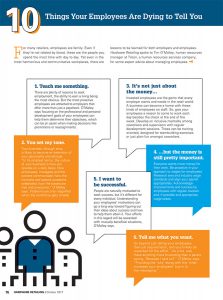
Click the picture to download a PDF of this story.
For many retailers, employees are family. Even if they’re not related by blood, these are the people you spend the most time with day to day. Yet even in the most harmonious and communicative workplaces, there are lessons to be learned for both employers and employees. Hardware Retailing spoke to Tim O’Malley, human resources manager at Tilson, a human resources services company, for some expert advice about managing employees.
- Teach me something.
There are plenty of reasons to seek employment, the ability to earn a living being the most obvious. But the most proactive employees are attracted to employers that offer more than just a paycheck. O’Malley says focusing on the professional and personal development goals of your employees can help them determine their objectives, which can be an asset when making decisions like promotions or reassignments. - You set my tone.
Your business, through time, is likely to become an extension of your personality and attitude. “In its simplest terms, the culture of your business is how you operate on a daily basis: How employees, managers and the owners communicate; how the triumphs and special occasions celebrated; how the losses are met and overcome,” O’Malley says. Problems are only magnified when the workforce gets smaller. - It’s not just about the money …
Invested employees are the gems that every employer wants and needs in the retail world. A business can become a home with these kinds of employees on staff. So, give your employees a reason to come to work each day besides the check at the end of the week. Develop an inclusive mentality among coworkers and supervisors with regular development sessions. These can be training oriented, designed for teambuilding exercises or just plain fun amongst coworkers. - … but the money is still pretty important.
Everyone wants more money for their work. Be proactive in your approach to wages for employees. Research area and industry wage standards and align your payroll appropriately. Acknowledge improvements and success by employees with regular reviews and, if possible and appropriate, wage raises. - I want to be successful.
People are naturally motivated to seek success, but it’s different for every individual. Understanding your employees’ motivations can go a long way toward figuring out their ideas about success and how to help them attain it. Your efforts in this regard will be rewarded with mutually beneficial situations, O’Malley says. - Tell me what you want.
Go beyond just telling your employees their job requirements, and you’ll likely be rewarded for the effort. “As a kid, was there anything more frustrating than a parent saying, ‘Because I said so?’” O’Malley says. “Providing the ‘why’ along with the ‘what’ increases your employees’ buy-in to the messaging.” - Why does this keep happening?
Every company has them—frustrating habits and occurrences that keep sticking around. O’Malley says it can be easy to dismiss suggestions from inexperienced employees, but changing that attitude can open your business up to new perspectives that can help you stay competitive. “Ask yourself, ‘Do we seriously consider suggestions?’ Employees want a job where they know they matter and where they can make a difference,” O’Malley says. - I think I work harder than you.
Even if employees respect the work put in by managers, sometimes employees might think they are holding down the fort, leading to frustration and jealousy. Managers can avoid this problem by keeping lines of communication open and providing affirmation of a job well done. Only responding to negative results can lead to a “no news is good news” attitude, O’Malley says, which can drive down productivity and morale. - I have some notes.
Employees know what’s happening in your store. Who better to discuss future decisions than the people you trust with your business? Allow your employees to express these thoughts in a constructive way with positive and even negative feedback. Meetups between employees and managers help maintain communication and transparency. - My trust is valuable if earned.
An employer puts their trust in every new hire. Sometimes, that trust ends up not being rewarded, but is necessary in the constant search for employees who deserve that trust. There is trust to be earned from employees as well, and like any relationship, it can be the dealbreaker for success. Employees must trust you when you talk about the future of the business and their employment. If waters are troubled, be honest with employees rather than obscure their view. You don’t need to have employees involved in all details of your business strategies, but employees are quick to seize on signs that outcomes aren’t lining up with statements from the top. It’s best to tell the truth.
Members of the North American Retail Hardware Association have access to human resources best practices consulting and services through Tilson HR. For more information, visit tilsonhr.com/nrha.
 Hardware Retailing The Industry's Source for Insights and Information
Hardware Retailing The Industry's Source for Insights and Information








